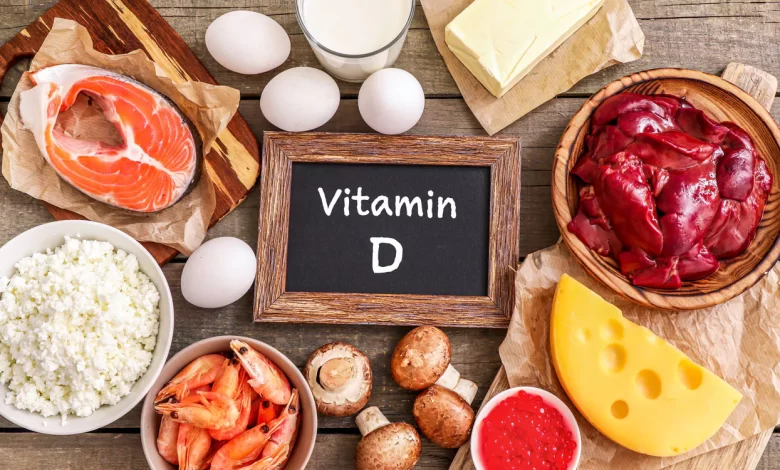The Shocking Vitamin D Discovery That Could Change Your Health Forever

Vitamin D has long been known as the “sunshine vitamin,” an essential nutrient our bodies produce when exposed to sunlight. For decades, it was primarily associated with bone health and the prevention of rickets. But in recent years, scientists have uncovered shocking new evidence about the far-reaching effects of vitamin D—and the findings could change the way you view your health forever.
From boosting your immune system to protecting your brain and even extending your lifespan, vitamin D plays a role in almost every major function of the human body. Yet, despite its importance, an estimated 1 billion people worldwide are deficient in this vital nutrient. Could a lack of vitamin D be silently undermining your health? Let’s dive deep into the latest research and discoveries.
What Is Vitamin D?
Vitamin D is a fat-soluble vitamin that acts more like a hormone in the body than a traditional vitamin. Once absorbed through sunlight, food, or supplements, vitamin D is converted into its active form, calcitriol, which interacts with receptors on nearly every cell in the body.
There are two main types:
- Vitamin D2 (ergocalciferol): Found in plant sources like mushrooms.
- Vitamin D3 (cholecalciferol): Found in animal sources and produced in the skin after sun exposure.
Vitamin D3 is considered more effective at raising blood levels of vitamin D, making it the preferred form in supplements.
The Shocking Discovery: Vitamin D Affects More Than Just Bones
For decades, doctors focused on vitamin D’s role in calcium absorption and bone health. While this remains crucial, newer studies reveal that vitamin D receptors exist in almost every organ, including the heart, brain, pancreas, and immune system.
This means vitamin D deficiency can have widespread consequences far beyond weak bones.
Here are some of the most groundbreaking discoveries about vitamin D:
1. Vitamin D and the Immune System
One of the most shocking revelations is vitamin D’s powerful impact on immunity. Research shows that vitamin D can:
- Enhance white blood cell function, improve your body’s ability to fight infections.
- Increase the production of antimicrobial peptides, natural substances that kill bacteria and viruses.
- Reduce the risk of autoimmune diseases like multiple sclerosis, type 1 diabetes, and rheumatoid arthritis.
In fact, a large meta-analysis published in the BMJ found that vitamin D supplementation reduced the risk of acute respiratory infections by 12%.
This discovery has huge implications—especially in light of global pandemics—suggesting that vitamin D could be a low-cost, natural way to strengthen population-wide immunity.
2. Vitamin D and Mental Health
Another shocking discovery is the strong link between vitamin D and brain health. Vitamin D receptors are highly concentrated in areas of the brain responsible for mood regulation, memory, and cognitive function.
Studies have linked low vitamin D levels to:
- Depression
- Anxiety disorders
- Seasonal Affective Disorder (SAD)
- Increased risk of dementia and Alzheimer’s disease
One groundbreaking study found that people with vitamin D deficiency had a 75% higher risk of developing depression compared to those with healthy levels. Supplementing with vitamin D has been shown to improve mood and even reduce symptoms of clinical depression in some individuals.
3. Vitamin D and Heart Health
Cardiovascular disease remains the leading cause of death worldwide—and vitamin D may play a bigger role than we ever realized.
Research suggests that vitamin D deficiency contributes to:
- High blood pressure (hypertension)
- Arterial stiffness
- Increased risk of heart attack and stroke
A study from Harvard showed that low vitamin D levels were associated with a 64% increased risk of heart disease. This shocking finding suggests that maintaining optimal vitamin D could be as important for your heart as exercise and a healthy diet.
4. Vitamin D and Cancer Prevention
One of the most surprising and hopeful areas of vitamin D research is its role in cancer prevention. Scientists discovered that vitamin D regulates genes involved in cell growth and repair, helping prevent uncontrolled cell division—the hallmark of cancer.
Studies suggest adequate vitamin D levels may reduce the risk of:
For example, women with higher blood levels of vitamin D had a 50% lower risk of breast cancer in one study. While more research is needed, the potential of vitamin D as a natural cancer-prevention tool is groundbreaking.
5. Vitamin D and Longevity
Could vitamin D actually help you live longer? Some shocking studies suggest the answer may be yes.
Vitamin D deficiency has been linked to premature aging, chronic inflammation, and increased mortality. On the other hand, optimal levels are associated with reduced risk of age-related diseases and improved longevity.
One large-scale study found that people with sufficient vitamin D levels had a 30% lower risk of dying from any cause compared to those deficient. This means vitamin D could be one of the simplest ways to extend your lifespan.
How Much Vitamin D Do You Really Need?
Here’s where the shocking part comes in: most people are not getting enough.
The recommended daily allowance (RDA) is:
- 600 IU per day for adults under 70
- 800 IU per day for adults over 70
However, many experts argue that these numbers are far too low. Studies show that optimal blood levels of vitamin D (measured as 25-hydroxyvitamin D) are between 40–60 ng/mL. Achieving this often requires 2,000–5,000 IU per day—far above the current RDA.
The Silent Epidemic: Vitamin D Deficiency
Despite its importance, vitamin D deficiency is shockingly common. Risk factors include:
- Limited sun exposure (indoor lifestyles, long winters, sunscreen use)
- Darker skin pigmentation (melanin reduces vitamin D synthesis)
- Obesity (vitamin D is stored in fat tissue, reducing availability)
- Aging (older skin produces less vitamin D)
- Poor diet (few foods naturally contain vitamin D)
Symptoms of deficiency can be subtle but may include:
- Fatigue
- Frequent illness
- Bone or muscle pain
- Low mood or depression
- Slow wound healing
Long-term deficiency can lead to osteoporosis, heart disease, cognitive decline, and more.
The Best Sources of Vitamin D
1. Sunlight
The most natural source of vitamin D is sunlight. Just 15–30 minutes of sun exposure on the skin (without sunscreen) a few times a week can boost vitamin D production. However, location, season, and skin color all influence how much vitamin D you make.
2. Food Sources
Few foods naturally contain vitamin D, but good sources include:
- Fatty fish (salmon, mackerel, sardines)
- Cod liver oil
- Egg yolks
- Fortified dairy and plant milks
- Fortified cereals
3. Supplements
For most people, supplements are the easiest way to achieve optimal levels. Vitamin D3 (cholecalciferol) is the preferred form. Pairing it with vitamin K2 and magnesium improves absorption and reduces potential risks like calcium buildup.
Can You Take Too Much Vitamin D?
Yes—though rare, excessive vitamin D can cause toxicity, leading to high calcium levels, kidney damage, and heart problems. Toxicity usually occurs only with extremely high supplemental doses (over 10,000 IU daily for months).
The safest approach is to get your vitamin D levels tested through a simple blood test. This ensures your supplementation is tailored to your needs.
How to Check Your Vitamin D Levels
A simple blood test called 25-hydroxyvitamin D (25(OH)D) measures your vitamin D status.
- Deficient: <20 ng/mL
- Insufficient: 20–29 ng/mL
- Optimal: 40–60 ng/mL
- Potentially harmful: >100 ng/mL
If you suspect deficiency, ask your doctor for a test. Regular monitoring is especially important if you take high-dose supplements.
Vitamin D Myths and Misconceptions
Despite growing evidence, myths about vitamin D persist:
- Myth 1: I get enough from food.
In reality, diet alone rarely provides sufficient vitamin D. - Myth 2: Sunscreen completely blocks vitamin D.
While sunscreen reduces production, casual everyday use usually doesn’t block it entirely. - Myth 3: Only bones need vitamin D.
Research shows it affects nearly every system in the body, from immunity to mental health.
The Future of Vitamin D Research
The discoveries about vitamin D are only the beginning. Scientists are currently exploring:
- Its role in diabetes prevention
- How it affects gut health and the microbiome
- Its potential to improve athletic performance and muscle strength
- Connections between vitamin D and fertility, pregnancy, and child development
With ongoing studies, vitamin D may soon become one of the most powerful and affordable tools for preventing chronic disease worldwide.
Final Thoughts: Could Vitamin D Change Your Life?
The shocking discoveries about vitamin D prove that this nutrient is far more than just a bone-strengthener. From protecting your heart to boosting your brain, fighting infections, lowering cancer risk, and even extending your life, vitamin D could be the missing link in your health.
Yet, deficiency remains widespread—and often silent. The good news is that fixing it is simple: a little more sun, the right foods, and smart supplementation can help you reach optimal levels.
If you want to change your health forever, start by asking one question: What’s my vitamin D level? The answer could transform your life.
Frequently Asked Questions (FAQs)
- How do I know if I’m vitamin D deficient?
The only way to know for sure is through a blood test (25(OH)D). Symptoms like fatigue, frequent illness, and low mood may also signal deficiency. - Can I get enough vitamin D from the sun alone?
It depends on your location, skin tone, and lifestyle. People in northern latitudes or those who spend little time outdoors often need supplements. - What’s better—vitamin D2 or D3?
Vitamin D3 is more effective at raising and maintaining healthy vitamin D levels. - Should I take vitamin K2 with vitamin D?
Yes, vitamin K2 helps direct calcium into bones and away from arteries, making vitamin D supplementation safer and more effective. - Can vitamin D help with weight loss?
Some studies suggest that adequate vitamin D may improve metabolism and weight lose, but it’s not a magic solution.
6. Is it safe to take vitamin D every day?
Yes, daily supplementation is safe for most people when taken in recommended amounts (usually 1,000–5,000 IU per day).




